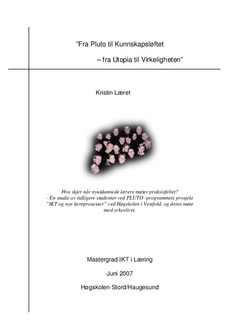| dc.description.abstract | For my approach to this problem scenario, I chose a combination of the quantitative and
qualitative methods. I chose to use a survey questionnaire to chart an entry identifier. This
questionnaire identified four factors that seemed to be of particular significance as far as what
thoughts the former students had after the project was concluded. I organized the interview
guide based on the same four areas of focus, which were context, teamwork/collaboration,
folder methodology, and ICT. I conducted two focus groups, and the participating respondents
were former students of the general studies teacher-program, and participants in ICT and new
learning processes at Vestfold University College. The fact that I was myself a participant in
this project could be both an advantage and a disadvantage to my current study. In one way it
gave me unique access to the project’s silent aspects, and thereby the activities’ silent aspects
as well. On the other hand, it gave me a predisposition which would unavoidably affect my
interpretation and analysis. My goal has still been to achieve as objective of an analysis as
possible, taking these circumstances into consideration.
I suspected that what the former students believed were the most essential aspects of the
project they participated in, would also be what affected them the most in the way they work
in their career after completing their education. My analysis proved that this was partially
true. The different didactic aspects of PLUTO, which in addition were identical with those
aspects revealed in my survey, have more or less been continued by the students. Even though
the framework factors in many cases actually limited the development, all the project
participants still stated that the project at Vestfold University College was correct time-wise
with respect to ICT focus in their current field of practice. When it came to teamwork and
collaboration, all the participants agreed that they used many of their experiences and much of
their competence from the project in their professional career, and that they most likely would
have functioned differently as teachers without these experiences. Integration of ICT as a
pedagogic tool, through open, digital portfolios on the Internet, as the participants were made
familiar with through the project, has not turned out identically in their professional lives. The
portfolios currently used by the participants focus more on products than on the process itself,
and none of the participants fully use this portfolio methodology with logs and metareflections.
But as time passes, ICT focus in Norwegian schools works in the participants’
favor. Through the Knowledge Promotion, it would seem that the former PLUTO students
have been helped in advancing their work with cooperative learning, portfolio methodology
and pedagogic use of ICT, which was the primary objective of ICT and new learning
processes to begin with. | en |
